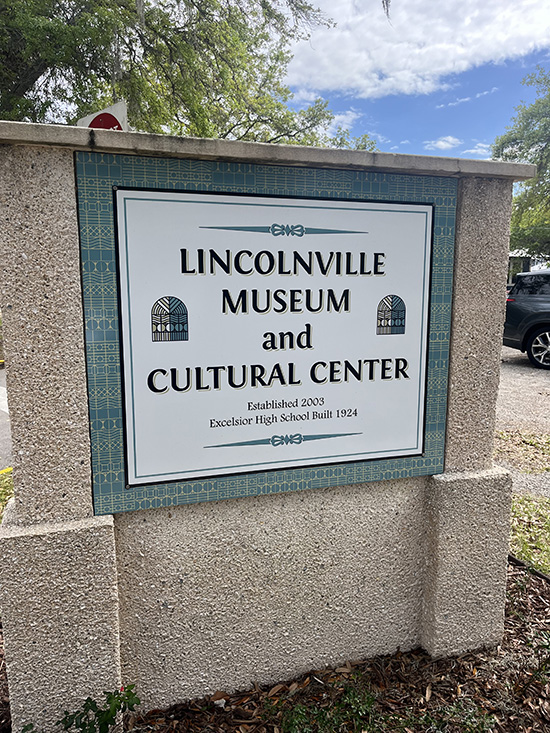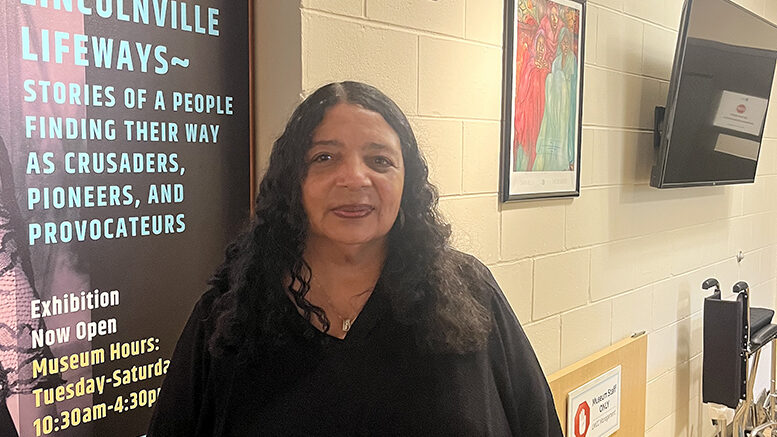By Chloe Smith
When Gayle Phillips walked through the doors to the Lincolnville Museum and Cultural Center for the first time, she had no idea the role she would play.
Now, after almost eight years of transforming a building on its last legs into a museum capturing American history, Phillips still sees more for the future of the center in St. Augustine, Florida.
“I want to see it be a success. I want to see it sustainable. I want to be able to look back and not think that all the hard work and the long nights of writing national grants were just an exercise for utility,” said Phillips. “We’ve come too far to turn back now.”
But, reaching sustainability in an area like St. Augustine’s Lincolnville — where the community appears to be ever-changing — poses several significant challenges.
The Lincolnville Museum and Cultural Center, or the LMCC, is one of the few remaining African-American historical sites in St. Augustine. The museum is located in the former Excelsior High School — the city’s first public black high school — and chronicles more than 450 years of African-American history through the arts, illuminating the richness of St. Augustine’s Black history.
Lincolnville, informally established by newly freed slaves in 1866, was founded following the American Civil War. Between the various exhibits, artifacts and displays, the Lincolnville Museum and Cultural Center depicts everything from local Black history going back 300 years to the Civil Rights Era. Two of their current exhibits, “Lincolnville LifeWays” and “Defenders,” tell stories of the Lincolnville Neighborhood in the early 20th century and how African people contributed to the early success of Florida.
But as the nation’s oldest city falls victim to gentrification, preserving the rich racial history in Lincolnville becomes increasingly more difficult for Phillips. “It becomes more and more challenging every day,” she said.

Jacksonville native Gayle Phillips first moved to St. Johns County in 1998, but it was not until 2015 that she began volunteering. Now Executive Director, Phillips initially had no intentions of getting involved with the Lincolnville Museum as she was already retired.
“I did not really want to go, but I did, and I walked in and looked around, and I was like, ‘wow, this place needs help, what can I do?’ I said it out loud, and the rest is history,” said Phillips.
But, as the Lincolnville Museum developed, so did the surrounding community. The consequences of gentrification can be seen all throughout St. Augustine, with boosted property values and higher taxes. One of the most evident examples is found in the Lincolnville community.
Settled by former slaves in 1866, Lincolnville is the most prominent historically-black neighborhood in St. Augustine. Because of this, Phillips said many of Lincolnville’s long-term residents are determined to maintain the valuable racial history. Neighborhood newcomers, on the other hand, are not too concerned.
“It’s changed the character of the neighborhood quite a bit,” Phillips said, referring to the newer Lincolnville residents lacking a strong sense of community.
Lincolnville underwent a massive transition over the last decade as St. Augustine quickly became one of the most visited cities in America. With that came the addition of Airbnb properties, bed and breakfasts and numerous other vacation rentals to the point where the close-knit community Phillips once knew no longer existed.
One of the changes she’d like to see within the Lincolnville community is putting more emphasis on the museum.
“Really, I think the greatest thing would be to get people to recognize it as, even though it’s a local museum, that it has national significance,” said Phillips.
With more support from the community, the LMCC could reach a point of financial stability, taking a massive weight off Phillip’s shoulders.
“We’re so close, it’s hard to walk away, but we’re still so far away from where we need to be, as far as having the kind of funding that is dependable,” said Phillips.
Assistant Director of the Lincolnville Museum and Flagler College alumna Caroline Davis said reaching sustainability is critical for the museum, explaining how it “ensures that those important stories of Lincolnville and local Black history are not lost.” She noted that “it takes funding to keep up a historic and non-profit institution.”
Apart from the urgency of becoming financially stable, there is also the added pressure of running one of the last remaining historical sites in a gentrified neighborhood.
“It should not be left up to individuals to decide whether this history continues,” said Phillips. “It should be something that would be a public asset. You know, we don’t own it; we’re just here to be stewards of it.”
As involved as she is now, one would never know Phillips started without any prior knowledge or interest in operating a museum. She quickly developed a deep devotion to her work and the mission of the Lincolnville Museum.
“I think her passion is shown through the growth of the museum itself,” said Davis. “She has worked years to build up the LMCC, elevating the museum to an entirely new level.”
Phillips only makes about half what a typical museum director makes, but she shows up to work every day of the week. She has transformed the museum by establishing full-time staff, renovating the building, opening consistently with operating hours five days a week, offering memberships, and making numerous other reforms over the years.
“That’s just my level of commitment that I do that because if you’re gonna do something, you need to do it well or not at all,” said Phillips.
Unfortunately, the current pay is insufficient for Phillips to want to stay in her position for much longer. Ideally, she would like to hire a museum professional committed to the work, allowing Phillips to step back and take up a lower position.
But, Phillips has made a priceless contribution, not just to the Lincolnville Museum, but to the preservation of African American history in St. Augustine, making her shoes incredibly difficult to fill.
After several selfless years at the Lincolnville Museum, Phillips feels a sense of pride as she reflects on all she and her team have accomplished so far.
“The fact that we have a museum that we can be proud of that people walk in. And they love the stories, the stories are easy to follow, they get the significance of it,” said Phillips. “I think that, the fact that we’re here and we’re open, and the stories are as evident as they are, and we’re able to. We may not be where we want to be, but we get a significant number of people to come through here on a consistent basis to say this is a real museum of importance.”
As for the future of the Lincolnville Museum, it is clear Phillips seeks much more success. The Lincolnville Museum and Cultural Center is integral to St. Augustine, but Phillips and her team need more support to keep it growing. To learn more about the Lincolnville Museum and Cultural Center, visit https://www.lincolnvillemuseum.org/.




Be the first to comment on "Phillips seeking national significance for historic Lincolnville Museum"